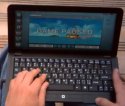Android on ARM “very snappy,” analysts say
Jun 16, 2009 — by Eric Brown — from the LinuxDevices Archive — views Android running on ARM-based “smartbooks” looks “very snappy” compared to Windows 7 on an Intel Atom, Gartner analysts are said to have declared. Meanwhile, according to another industry report, Garmin-Asus says it will ship an Android-based Nuvifone smartphone by year's end.
Android running on ARM-based “smartbooks” looks “very snappy” compared to Windows 7 on an Intel Atom, Gartner analysts are said to have declared. Meanwhile, according to another industry report, Garmin-Asus says it will ship an Android-based Nuvifone smartphone by year's end.
In the last week or two, the Palm Pre and the new iPhone 3G S may have dominated the headlines, but the Android news just keeps on coming. Even if no one designs an Android handset as cool as the Pre or the iPhone (and they most likely will) the Google-backed, Linux-based Android appears to be unstoppable both on the netbook and smartphone fronts. (Among other software endorsement news for the open-source mobile stack, Boingo has started supporting Android with its WiFi client — see link at end of story.)
Gartner praises Android smartbooks
 Snapdragon-based smartbook prototype (Click for details) |
The recent Computex show was awash in both Android rumors and demos on smartphones, netbooks, and ARM-based “smartbooks” based on Qualcomm Snapdragon or Freescale i.MX515 SoCs. As the name implies, the smartbook aims to stake out the MID-like territory between the smartphone and netbook.
Now IDG News Service reports that two Gartner analysts, Christian Heidarson and Ben Lee, have written a report saying they were highly impressed with the various Android smartbook demos at Computex. “When Android did work,” they were quoted as saying, suggesting that some of the demos were pretty cutting-edge indeed, “we found that the user interface was very snappy on relatively low-performance ARM processors, more so than Windows 7 on Atom.”
While most of the Computex Android-on-netbook demos were based on the Snapdragon or the i.MX515, the IDG story says that Elitegroup Computer Systems (ECS) showed off an Android mini-netbook powered by ARM-based chips from Texas Instruments. While the ECS site seems to be mum on the topic, the device was presumably based on the ARM Cortex A8-based OMAP35xx SoCs, which are found in the new Touch Book from Always Innovating, or else the new Cortex-A9-based OMAP44xx. TI has refused to join the “smartbook” branding craze, preferring to call them small netbooks, but the company appears to be interested in the segment, nonetheless.
Garmin-Asus to focus on Android
The confusing messages coming out of the Garmin-Asus partnership on its “Nuvifone” smartphones continue to be adjusted. In May, the alliance announced that the Linux version of the navigation-oriented smartphone, called the G60 (pictured at top), would be delayed to the second half of the year. Then earlier this month, we heard that an Android version of the Nuvifone would arrive in the first quarter of 2009 to join the Linux and Windows Mobile versions.
Now, according to CNET Asia, Garmin-Asus executives have stated that the Android version will be ready by the end of the year. In addition, they were said to have commented that the G60 will be the last of the Linux devices to use the existing in-house Linux stack. Future Linux models will all use Android, says the story.
Android in Europe
 HTC Magic (Click for details) |
With T-Mobile selling the HTC G1 on both sides of the Atlantic, and Vodafone now selling the HTC Magic in Europe, Android appears to be making headway in the world of the euro. There certainly appears to be plenty of activity on the German “Android-Hilfe” forum site, which claims to be the largest Android site in Europe. For more on HTC's Android plans in Europe, Mobinaute recently published an interview with Frederic Tassy, CEO of HTC for France and Benelux. A translated version may be found here.
Availability
The CNET Asia story on Garmin-Asus may be found here, and the IDG News Service story on Gartner's smartbook analysis may be found here.
Boingo's download page showing Android support for its WiFi client may be found here.
This article was originally published on LinuxDevices.com and has been donated to the open source community by QuinStreet Inc. Please visit LinuxToday.com for up-to-date news and articles about Linux and open source.